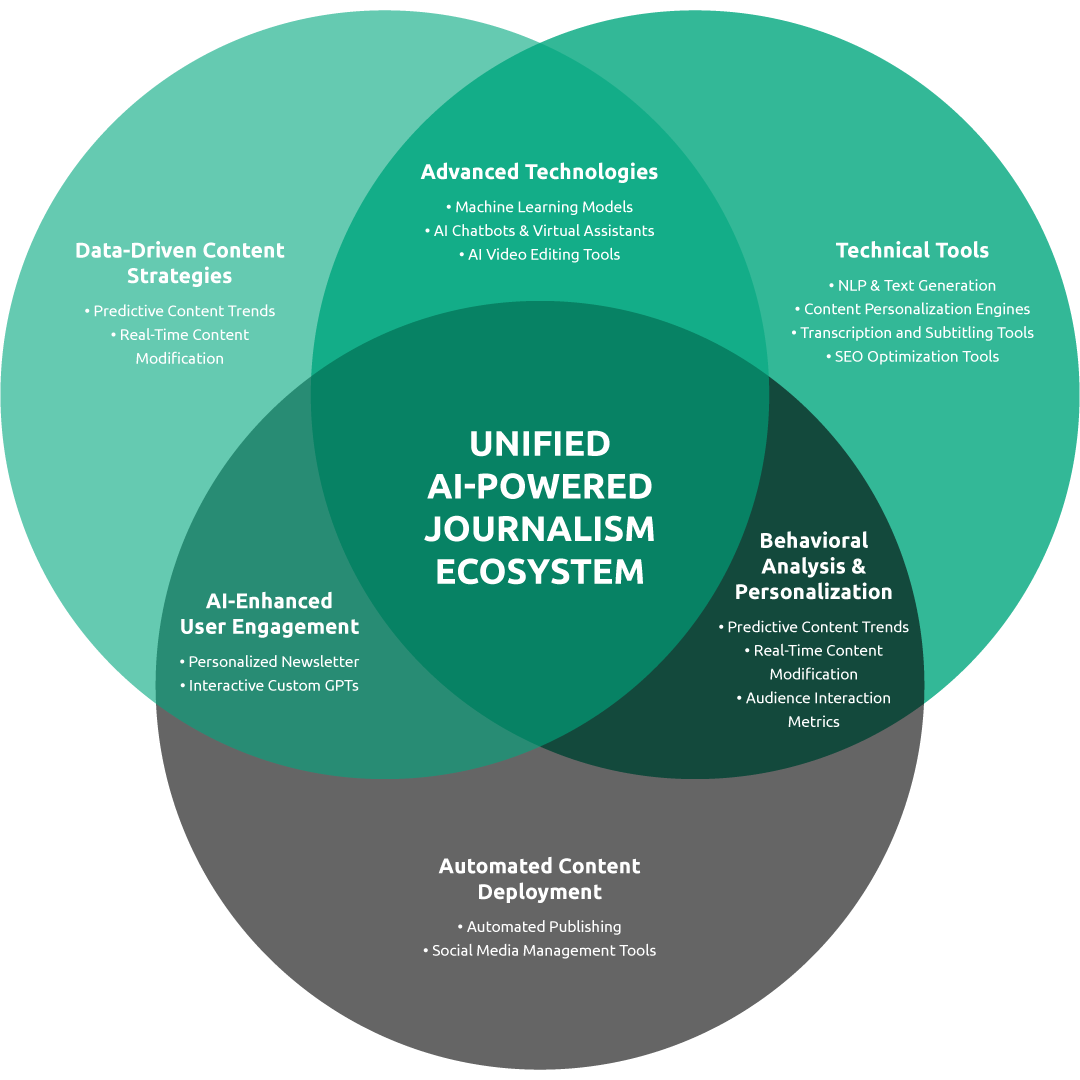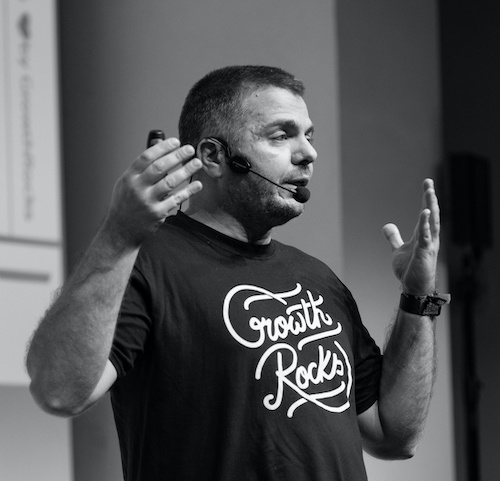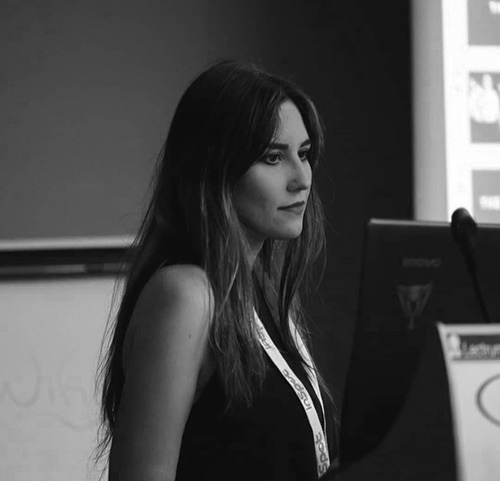A concise, 9-hour program designed to introduce Journalists, Researchers, Storytellers, and Media copywriters to the world of AI-driven journalism.
In training business for many years. Delivering courses that made a difference in student’s personal and professional life. Our Alumni network is our best ambassador. and it’s not a growth “hack” it’s just passion for quality
Growth Hacking University • on-demand • in-house • AI Course for Journalists
The syllabus spans various aspects of AI applications in journalism, focusing on improving efficiency, accuracy, and audience engagement through technology. It covers essential topics such as using AI for transcription, creating Greek subtitles for videos, optimizing articles for search engines, and generating content suggestions based on keyword research.
Participants will also delve into advanced journalistic research, learn how to integrate custom GPTs into their websites, and discover strategies to avoid detection of AI-generated content by Google. The course also includes modules on social media tools, short video creation, user comment moderation, and AI-driven video editing.
Additionally, it covers advanced translation and adaptation techniques, AI photo editing, and AI-enhanced editorial processes.
The program culminates with modules on AI-generated podcasts and AI-driven news bulletins or YouTube shows, teaching the use of AI tools to create and manage multimedia content.
This program is structured to provide hands-on experience and practical knowledge, making it ideal for professionals seeking to integrate AI into their journalistic practices efficiently.
There are various types of content in journalism: original, repurposed, and adapted. AI transforms the way news is created and consumed.
In this introductory lesson, we will provide an overview of the “AI for Journalists” course. Participants will gain an understanding of the course structure, the key topics that will be covered, and the benefits of integrating AI into journalistic practices. We will discuss the objectives of each lesson and how AI can transform various aspects of journalism, from content creation to audience engagement.
This session sets the stage for a comprehensive exploration of AI tools and techniques tailored for media professionals.
Transcription
In this lesson, we will explore tools for transcribing recorded audio and video materials accurately and efficiently.
non-english subtitling
In this lesson, we will learn about tools that generate direct Greek subtitles for videos, making content more accessible.
Short Videos
In this lesson, we will learn about tools that identify and extract the most engaging one-minute clips from longer videos, suitable for platforms like reels or TikTok.
AI Video Editing
In this lesson, we will explore AI tools for editing videos, including automatic cropping, resizing, and adding overlays, enhancing the visual appeal of your video content.
Translation and Adaptation
In this lesson, we will delve into advanced translation tools that adapt the tone of voice to match the specific style of each media outlet or journalist. For instance, feeding the tool twenty of your articles to ensure the translated text retains your unique writing style.
AI Podcasts
In this lesson, we will learn how to use tools like Eleven Labs to create and manage AI-generated podcasts, automating the production process for audio content.
AI News Bulletins or YouTube Shows
In this lesson, we will leverage tools to create AI-driven news bulletins or YouTube shows, enhancing video content production based on techniques introduced in previous courses.
In this lesson, we will cover:
Moderation in User Comments
In this lesson, we will implement automatic moderation tools to manage user comments effectively and maintain a positive online environment.
AI Photo creating and Editing
In this lesson, we will cover:
SEO Optimization
In this lesson, we will understand how to optimize articles for search engines by improving headings (especially H1), formatting, paragraph sizes, and keyword usage to make content more Google-friendly.
Content Suggestions Based on Keyword Research
In this lesson, we will discover tools that suggest topics based on specific keywords, predict long-tail and sub-keywords, and provide ideas for content development, such as generating topic ideas related to “Euro 2024.”
Journalistic Research
In this lesson, we will utilize tools for conducting thorough journalistic research, including finding sources and verifying facts for various features, such as profiles on young Premier League scorers or biographical pieces on public figures like Barack Obama.
Avoiding Detection of AI-Generated Content by Google
In this lesson, we will explore strategies and best practices for ensuring AI-generated content is not flagged by Google, maintaining the integrity and authenticity of your work.
In this lesson, we will learn how to create and embed custom GPTs on your website for interactive user experiences, such as an FAQ on the history of Euro 2024.
The goals of the “AI for Journalists” course include:

With decades of experience in Digital and Growth Hacking Marketing, your instructors will introduce you to AI for hospitality and share with you their secrets, techniques, and most effective growth tips.

Theo created a multi-million network of GH Agencies in just 2 years. Woking In marketing for 20+ years comes with a series of examples on what to do in many niches and industries

Her in depth-experience as a growth marketer includes consulting as well as building and motivating high-performance marketing teams.
| Cookie | Duration | Description |
|---|---|---|
| _ga | 2 years | The _ga cookie, installed by Google Analytics, calculates visitor, session and campaign data and also keeps track of site usage for the site's analytics report. The cookie stores information anonymously and assigns a randomly generated number to recognize unique visitors. |
| _gat_UA-154575528-1 | 1 minute | A variation of the _gat cookie set by Google Analytics and Google Tag Manager to allow website owners to track visitor behaviour and measure site performance. The pattern element in the name contains the unique identity number of the account or website it relates to. |
| _gid | 1 day | Installed by Google Analytics, _gid cookie stores information on how visitors use a website, while also creating an analytics report of the website's performance. Some of the data that are collected include the number of visitors, their source, and the pages they visit anonymously. |
| CONSENT | 2 years | YouTube sets this cookie via embedded youtube-videos and registers anonymous statistical data. |
| cookielawinfo-checkbox-advertisement | 1 year | Set by the GDPR Cookie Consent plugin, this cookie is used to record the user consent for the cookies in the "Advertisement" category . |
| cookielawinfo-checkbox-analytics | 11 months | This cookie is set by GDPR Cookie Consent plugin. The cookie is used to store the user consent for the cookies in the category "Analytics". |
| cookielawinfo-checkbox-functional | 11 months | The cookie is set by GDPR cookie consent to record the user consent for the cookies in the category "Functional". |
| cookielawinfo-checkbox-necessary | 11 months | This cookie is set by GDPR Cookie Consent plugin. The cookies is used to store the user consent for the cookies in the category "Necessary". |
| cookielawinfo-checkbox-others | 11 months | This cookie is set by GDPR Cookie Consent plugin. The cookie is used to store the user consent for the cookies in the category "Other. |
| cookielawinfo-checkbox-performance | 11 months | This cookie is set by GDPR Cookie Consent plugin. The cookie is used to store the user consent for the cookies in the category "Performance". |
| elementor | never | This cookie is used by the website's WordPress theme. It allows the website owner to implement or change the website's content in real-time. |
| PHPSESSID | session | This cookie is native to PHP applications. The cookie is used to store and identify a users' unique session ID for the purpose of managing user session on the website. The cookie is a session cookies and is deleted when all the browser windows are closed. |
| viewed_cookie_policy | 11 months | The cookie is set by the GDPR Cookie Consent plugin and is used to store whether or not user has consented to the use of cookies. It does not store any personal data. |
| Cookie | Duration | Description |
|---|---|---|
| _gr | 2 years | |
| _gr_flag | 2 years |
| Cookie | Duration | Description |
|---|---|---|
| VISITOR_INFO1_LIVE | 5 months 27 days | A cookie set by YouTube to measure bandwidth that determines whether the user gets the new or old player interface. |
| YSC | session | YSC cookie is set by Youtube and is used to track the views of embedded videos on Youtube pages. |
| Cookie | Duration | Description |
|---|---|---|
| _landing | 1 year | No description available. |
| _referrer | 1 year | No description available. |
| _uc_current_session | 1 hour | No description available. |
| _uc_initial_landing_page | 1 year | No description available. |
| _uc_last_referrer | 1 year | No description available. |
| _uc_referrer | 1 year | No description available. |
| _uc_visits | 1 year | No description available. |
| _utmz_cf7 | 1 year | No description available. |
| CookieLawInfoConsent | 1 year | No description |
| GetLocalTimeZone | session | No description |
| ifso_page_visits | 16 years 15 days 13 hours 8 minutes | No description available. |
| ifso_visit_counts | 1 year | No description available. |
| nitroCachedPage | session | No description |
| prism_649664625 | 1 month | No description |